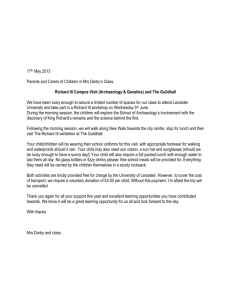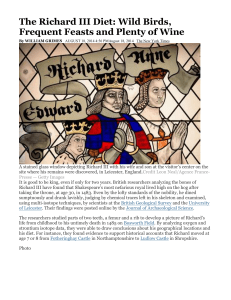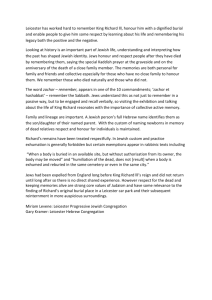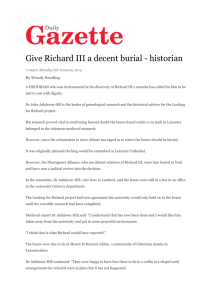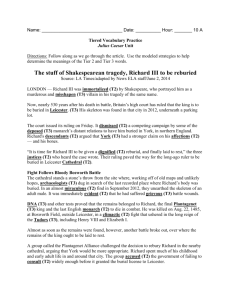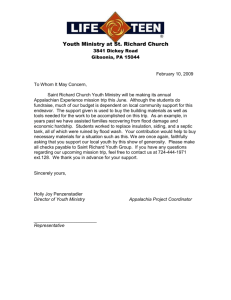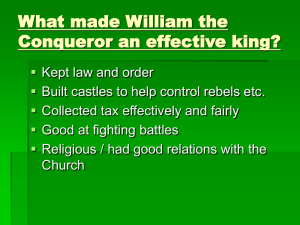SERVICE OF REINTERMENT OF THE REMAINS OF KING
advertisement
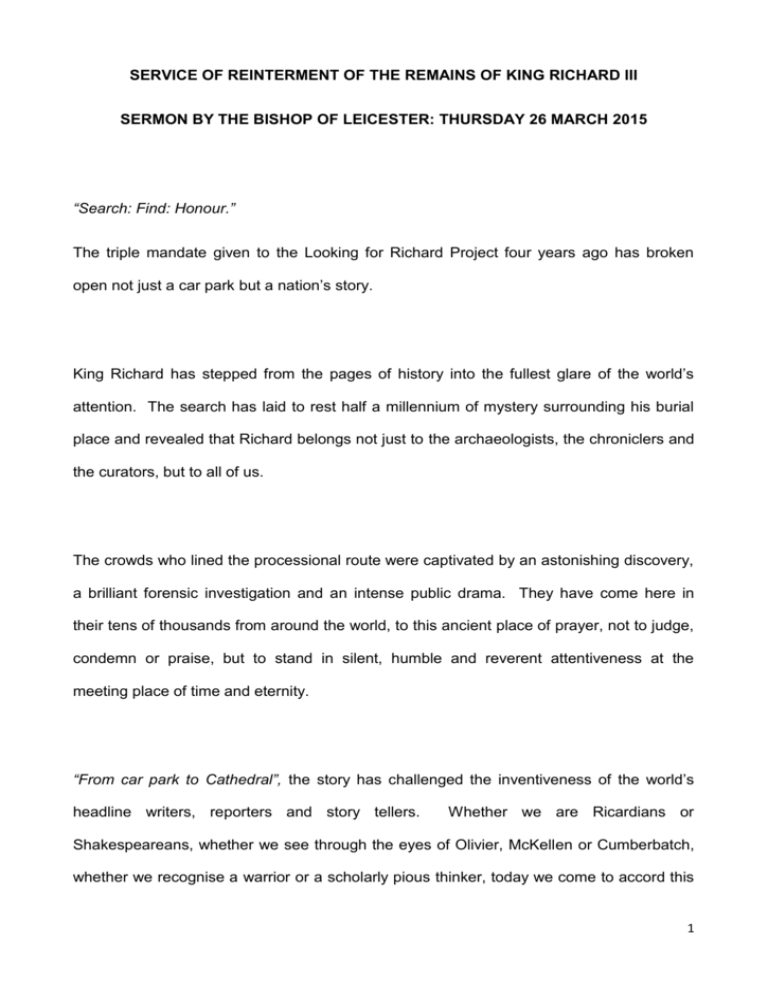
SERVICE OF REINTERMENT OF THE REMAINS OF KING RICHARD III SERMON BY THE BISHOP OF LEICESTER: THURSDAY 26 MARCH 2015 “Search: Find: Honour.” The triple mandate given to the Looking for Richard Project four years ago has broken open not just a car park but a nation’s story. King Richard has stepped from the pages of history into the fullest glare of the world’s attention. The search has laid to rest half a millennium of mystery surrounding his burial place and revealed that Richard belongs not just to the archaeologists, the chroniclers and the curators, but to all of us. The crowds who lined the processional route were captivated by an astonishing discovery, a brilliant forensic investigation and an intense public drama. They have come here in their tens of thousands from around the world, to this ancient place of prayer, not to judge, condemn or praise, but to stand in silent, humble and reverent attentiveness at the meeting place of time and eternity. “From car park to Cathedral”, the story has challenged the inventiveness of the world’s headline writers, reporters and story tellers. Whether we are Ricardians or Shakespeareans, whether we see through the eyes of Olivier, McKellen or Cumberbatch, whether we recognise a warrior or a scholarly pious thinker, today we come to accord this 1 King, this child of God, and these mortal remains, the dignity and honour denied them in death. From the ancient Hebrew Scriptures comes to us the story of the bones of Joseph, the patriarch of his people held in slavery for more than four centuries, and eventually carried to their resting place in the Promised Land. Their removal and reburial signified the people’s faith in God’s future and their determination never to return to bondage. Here in Leicester, five hundred years after Bosworth Field, the cityscape of friaries, abbeys and castles from which Richard rode to battle is now embellished by mosques, temples and gurdwaras. This city which will be home to Richard’s grave now strives to build harmony in place of conflict: to offer to a war torn world a beacon of mutual respect and honour across language, culture and belief. That mutual respect and honour has been palpable here in the days since the sudden, unexpected revelation of his remains lying in a cramped, unmarked grave forty yards from this Cathedral. The “Richard Effect” has revealed a deep connection between a global audience and this young King who bore his disability with courage and knew the pain of bereavement and loss close to his own heart. Many amongst the crowds who have thronged to see the casket came bearing their own burdens of grief; others came to contemplate the reality of their own mortality. All have confounded the sceptics by their respect for the remains of an anointed King and a baptised Christian whose lot it was to live and die at a turning point of our history. 2 In an age of celebrity, image and reputation is a commodity in the market place. Richard’s reputation, so much disputed and contested will, like all great figures of history, continue to clarify and evolve. But we come to reinter his remains today because reputation does not have the last word, for Richard or for any of us. This act of reburial draws our attention away from what it is possible to say with any certainty about King Richard towards what can be said with confidence about God, and therefore about all human life. The creed recited in this Cathedral and every Christian Church affirms a belief in the resurrection of the body and the life everlasting. The words speak of a God who is totally committed to what he has made and loved, and who will not let us go even on the far side of death. Ultimately, Christians believe in eternal life not because of some particular quality of any individual who has died, but because of what they believe about God. For eight centuries, in this place, Christians have recognised Jesus Christ as the one who steps from the pages of Scripture to become a living and life giving presence to all who seek him. The remains of King Richard will lie here between two vivid signs of that presence. To the East is the new Chapel of Christ the King – dedicated to the one whose kingship had no earthly security beyond the vulnerable, foolish and much despised rejection of violent power and control. 3 Such kingship is a constant affront to all earthly constructs of power. Such a kingdom shines a revealing spotlight on the essence of government as public service, embodied in every monarch’s coronation as the Sword of State is laid upon the altar of Westminster Abbey. At the approach of a General Election, these essential, unifying symbols of our common story point us to the values which unite us, to our responsibility for one another, to the “we” society rather than the “me” society. Five hundred years after the Wars of the Roses we still face the risk of damaging tribal behaviours, of the destructive instincts which can so quickly turn neighbours into strangers and corrode our sense of the Common Good. King Richard’s grave stands in the space between that symbol of kingship and the High Altar, where in Christian belief new life is made available to all who seek it in bread and wine. Around this table we learn to die to self and to realise that death is the inexplicable and inevitable path we must take to the nearer presence of God. In these two places we are reminded that God’s power is not like that of Kings, Presidents or Prime Ministers. God is not an infinitely magnified mirror of human control. We may no longer believe in the divine right of Kings, but we still have some way to go before we recognise the God whose power is most fully seen in weakness. Yet this is where we choose to lay the remains of King Richard – between the symbols of Christ’s kingship and the table of his intimate presence with us. They are the two beats of 4 the heart of all who have been called to leadership and service – engagement with the world for the sake of a more just society, and withdrawal in search of God’s nourishment of our souls. Richard, we may imagine, in his short life was familiar with both. His Book of Hours, present with us today, reflects his profound faith in and dependence on God’s mercy and love. In it are the words of this prayer: “Lord Jesus Christ deign to free me, your servant King Richard, from every tribulation, sorrow and trouble in which I am placed …….hear me in the name of all your goodness, for which I give thanks, and for all the gifts granted to me, because you made me from nothing and redeemed me out of your bounteous love and pity from eternal damnation to promising eternal life.” As we come to lay the remains of Richard to rest between these two holy places, we do so now in the faith we share with him. Whether we bear a white or a red rose, whether for Richard or Henry, whether for Stanley or Howard, whether for Leicester or York, we recognise at the graveside that all our journeys lead us to this place where reputation counts for nothing and all human striving falls to dust. We dare to pray for Richard today and for all who have gone before us in the sure and certain hope of the resurrection to eternal life because it is in God alone that we can trust. To Him be the power and the glory for all time and for eternity. Amen. 5

